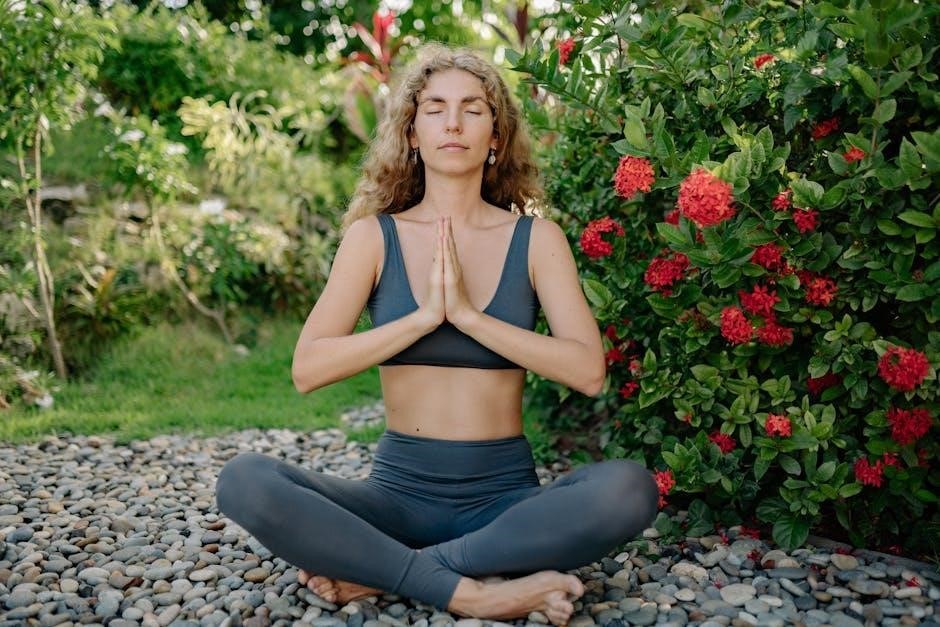spiritual exercises in daily life pdf
Category : PDF
Spiritual exercises in daily life are practices that help individuals cultivate inner peace, mindfulness, and a deeper connection to their values and beliefs. These exercises, rooted in traditions like St. Ignatius’s teachings, offer a structured approach to integrating spirituality into everyday routines. By dedicating time to reflection, meditation, and intentional actions, individuals can transform their lives, fostering personal growth and harmony. This journey emphasizes the importance of consistency and self-awareness, enabling people to navigate life’s challenges with clarity and purpose.
Understanding the Concept and Its Importance
Spiritual exercises in daily life are practices designed to deepen self-awareness, foster inner peace, and align one’s actions with their values. Rooted in traditions like St. Ignatius’s Spiritual Exercises, these practices emphasize mindfulness, reflection, and intentional living. They help individuals cultivate a sense of purpose and harmony, transforming everyday tasks into opportunities for spiritual growth. By integrating these exercises, people can navigate life’s challenges with clarity and resilience. The importance lies in their ability to bridge the gap between the sacred and the mundane, making spirituality accessible and meaningful in modern life. Regular practice leads to emotional balance, mental clarity, and a stronger connection to one’s true self.

Defining Spiritual Exercises
Spiritual exercises are structured practices aimed at fostering personal growth, self-reflection, and a deeper connection to oneself, others, and a higher power. They encompass meditation, prayer, mindfulness, and intentional actions designed to cultivate inner peace and purpose.

Purpose and Types of Spiritual Practices
Spiritual practices aim to foster personal growth, inner transformation, and a deeper connection to oneself and the divine. They include meditation, mindfulness, prayer, and gratitude exercises, designed to cultivate self-awareness and emotional balance. These practices help individuals navigate life’s challenges with clarity and purpose, promoting mental and emotional well-being. Types of spiritual exercises vary, ranging from silent reflection and journaling to community service and mindful daily tasks. Each practice serves as a tool for self-discovery and spiritual maturity, enabling individuals to align their actions with their values and beliefs. By integrating these practices into daily life, one can achieve a harmonious and purposeful existence.

Why Integrate Spiritual Exercises into Daily Life
Integrating spiritual exercises into daily life fosters mental clarity, emotional resilience, and a deeper connection to one’s values and purpose. These practices promote inner peace, mindfulness, and harmony, helping individuals navigate life’s challenges with grace and intention, leading to a more balanced and fulfilling existence.
Benefits of Spiritual Practices for Mental and Emotional Well-being
Spiritual practices, such as meditation and mindfulness, significantly enhance mental and emotional well-being by reducing stress and anxiety. These exercises cultivate inner peace, fostering resilience and emotional balance. Regular spiritual practices promote self-awareness, allowing individuals to better understand their thoughts and emotions, leading to improved decision-making and relationships. Gratitude practices, a key component, encourage positivity and contentment, while mindfulness helps individuals stay present, reducing worries about the past or future. By integrating these practices, individuals can experience profound emotional healing, increased joy, and a deeper sense of purpose in life. This holistic approach supports overall well-being, empowering individuals to navigate life’s challenges with greater ease and clarity.

The Connection Between Spirituality and Daily Activities
Spirituality seamlessly intertwines with daily life by transforming ordinary tasks into meaningful practices. Eating, working, and even interacting with others can become mindful, intentional acts that foster connection and purpose.
How to Infuse Mindfulness and Intention into Everyday Tasks
Infusing mindfulness and intention into daily activities involves approaching tasks with heightened awareness and purpose. Start by setting a clear intention at the beginning of the day, such as fostering gratitude or compassion. Engage fully in each task, focusing on the present moment without distractions. Simple acts like eating or walking can become meditative practices when done with attention. Incorporate short pauses throughout the day to breathe deeply and realign with your intentions. Ending the day with reflection helps identify moments of mindfulness and areas for growth. This practice transforms routine activities into opportunities for spiritual growth and emotional well-being.
Mindfulness and Meditation as Daily Spiritual Practices
Mindfulness and meditation are powerful daily spiritual practices that cultivate inner peace and focus. Regular practice enhances mental clarity and emotional balance, fostering a deeper connection to oneself and the divine.

Techniques for Incorporating Meditation into Your Routine
To incorporate meditation into your daily routine, start by setting a specific time, such as first thing in the morning or before bed. Create a dedicated space free from distractions, like a quiet corner or outdoor spot. Begin with short sessions, even five minutes, and gradually increase as you build the habit. Use guided meditations or apps to help you stay focused. Techniques like body scans, breath awareness, or loving-kindness meditation can deepen your practice. Consistency is key, so commit to meditating daily, even if briefly. Over time, this practice will enhance your mindfulness, reduce stress, and bring greater clarity to your spiritual journey;
The Role of Gratitude in Spiritual Growth
Gratitude fosters a deeper connection to the divine, shifting focus from lack to abundance, cultivating contentment, and nurturing a joyful, humble heart through daily reflection and appreciation.
Practices to Cultivate Gratitude in Daily Life
Cultivating gratitude involves intentional practices that shift focus to the positive aspects of life. Keeping a daily gratitude journal is a powerful tool, encouraging reflection on blessings, no matter how small. Mindful meditation can also foster gratitude by bringing awareness to the present moment and appreciating its beauty. Sharing gratitude with others, whether through kind words or acts of service, reinforces its impact. Incorporating prayer or thanksgiving rituals into daily routines further deepens this practice. These exercises help individuals reframe challenges as opportunities for growth, fostering a sense of contentment and spiritual fulfillment in everyday life.
Overcoming Challenges in Maintaining Spiritual Practices
Consistency is key to sustaining spiritual practices. Start small, set realistic goals, and remain flexible. Let go of perfection, embracing each moment as an opportunity to grow spiritually. Even brief daily reflections or mindful pauses can nourish the soul. Seeking guidance from spiritual leaders or communities can also provide motivation and support, helping to overcome obstacles and maintain a meaningful connection to your spiritual journey.

Strategies for Consistency and Motivation
To maintain spiritual practices, start with small, achievable goals and gradually build consistency. Incorporate exercises into your daily routine, such as morning meditation or evening reflection. Use a journal to track progress and identify patterns. Seek accountability by joining a spiritual group or finding a mentor. Celebrate milestones to stay motivated and remind yourself of the benefits, like increased calm and clarity. Embrace flexibility—missed days don’t mean failure; simply return to your practice. Focus on intention and effort rather than perfection. By staying committed and adaptable, you can sustain spiritual growth and integrate it seamlessly into your daily life for a more balanced and purposeful existence.
Spiritual exercises in daily life offer a transformative journey, fostering inner peace, mindfulness, and purpose. By embracing these practices, individuals can cultivate a deeper connection to their beliefs and values, leading to personal growth and a more meaningful existence. Consistency and intention are key to sustaining this lifelong journey, as it integrates seamlessly into daily routines, guiding one toward harmony and fulfillment.
Embracing Spiritual Exercises as a Lifelong Journey
Embracing spiritual exercises as a lifelong journey involves committing to daily practices that nurture the soul and guide personal growth. These exercises, such as meditation, gratitude, and mindfulness, become integral to one’s routine, fostering a deeper connection to oneself and the world. The journey is not about perfection but about consistent effort and self-awareness. By integrating spiritual practices into daily life, individuals can cultivate resilience, compassion, and clarity, leading to a more purposeful and fulfilling existence. This path encourages openness to transformation and renewal, helping one navigate life’s challenges with grace and intention. Spiritual exercises, when embraced longitudinally, offer a profound way to live a meaningful and spiritually enriched life.
